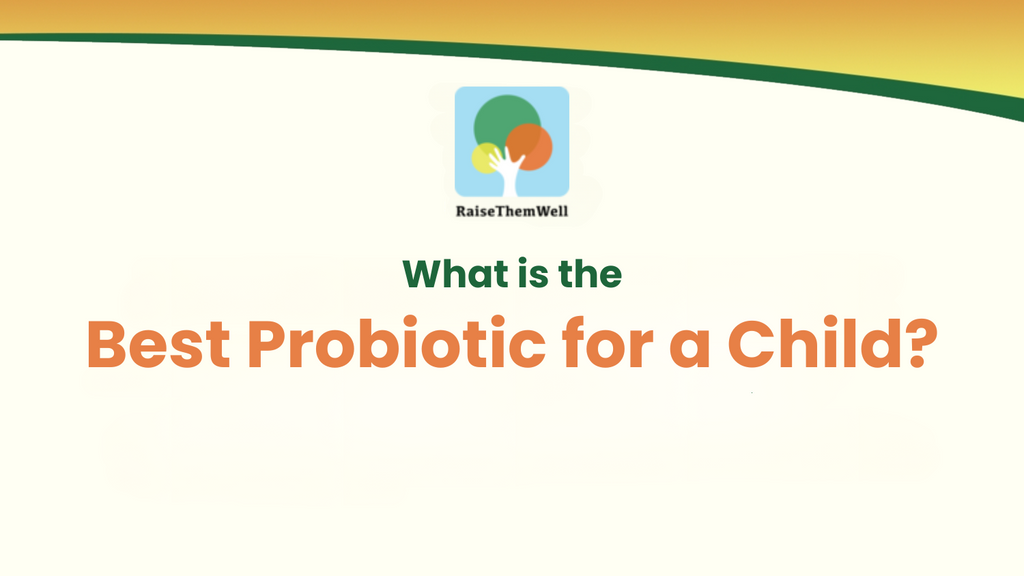What is the best probiotic for a child?
We are glad that you asked. Well, we might be a bit biased here, but we wholeheartedly believe that our probiotic for children is the absolute best. Here’s why:
1. No Artificial Nonsense: We know that kids (and their parents) deserve the best, which is why our probiotic for children contains no artificial flavors, artificial sweeteners, preservatives, colors, or dyes. Because who needs those extras when you're trying to keep your child healthy?
2. Powerful Punch: We made sure each serving has a sufficient number of colony-forming units (CFUs)[1,2] to make a real difference. We're talking 5 billion CFUs of friendly bacteria per serving - enough to give those little gut bacteria a fighting chance!
3. Yummy Berry Flavor: Let’s face it, getting kids to take their supplements can be a battle. But not with our great-tasting berry flavor! It’s so delicious that your child might just remind you it’s probiotic time.
4. Convenient and Reliable: Our chewable tablet is an ideal probiotic form for reliable dosing and convenience. Unlike other probiotic forms, our Children’s Chewable Probiotic needs no refrigeration, droppers, or other dispensing tools to deliver the right amount of friendly bacteria for digestive and immune health! This makes it quick and easy for your kids to enjoy the health benefits of a daily probiotic.
5. Perfect Blend of Probiotic Strains: We’ve included the four best synergistic strains of probiotics, combining both spore-based and regular probiotics to support gut health throughout the entire digestive tract. Here's the star-studded lineup of healthy bacteria in our chewable probiotics:
- Bacillus subtilis[3,4]: The superhero spore that survives stomach acid like a champ.
- Bifidobacterium longum[5,6]: A friendly type of bacteria needed in high quantities that supports digestion and immunity.
- Bacillus coagulans[7,8]: Another spore-based wonder, perfect for enduring the harsh stomach environment.
- Lactobacillus rhamnosus[9]: The all-rounder that aids in gut health and bolsters the immune system.

In summary, our probiotic is crafted with healthy children in mind, providing everything needed to support your child’s digestive health in a way that's effective and enjoyable. So, the next time you’re wondering what probiotic to choose for your little one, remember that ours has got it all: no junk, plenty of friendly bacteria, an easy chewable probiotic form, a taste kids love, and a perfect blend of the best probiotic strains. Trust us, your child’s gut will thank you!

Raise Them Well’s Children’s Chewable Probiotic is physician-formulated specifically for kids.
- Allergy-Friendly: Dairy-free, soy-free, gluten-free
- Non-GMO
- Vegetarian Friendly
What's Next?
How to tell if your child needs a probiotic supplement!
References:
1. Benjamin Kligler, Patrick Hanaway, Andreas Cohrssen (2007). Probiotics in Children. Pediatric Clinics of North America, 54( 6), 949-967.
2. Benjamin Kligler, MD, MPH, Andreas Cohrssen, MD (2008). Probiotics. Am Fam Physician, 78(9), 1073-1078.
3. Paytuví-Gallart, A., Sanseverino, W., & Winger, A.M. (2020). Daily intake of probiotic strain Bacillus subtilis DE111 supports a healthy microbiome in children attending day-care. Beneficial Microbes, 11(7), 611-620. https://doi.org/10.3920/BM2020.0022
4. M. Hatanaka, K. Yamamoto, N. Suzuki, S. Iio, T. Takara, H. Morita, T. Takimoto, T. Nakamura (2018). Effect of Bacillus subtilis C-3102 on loose stools in healthy volunteers. Beneficial Microbes: 9(3), 357-365. https://doi.org/10.3920/BM2017.0103
5. Olivares M, Castillejo G, Varea V, Sanz Y. Double-blind, randomised, placebo-controlled intervention trial to evaluate the effects of Bifidobacterium longum CECT 7347 in children with newly diagnosed coeliac disease. British Journal of Nutrition. 2014;112(1):30-40. https://doi.org/10.1017/S0007114514000609
6. Cruchet Muñoz S, Verbeke Palma S, Lera Marqués L, Espinosa Pizarro MN, Malig Mechasqui J, Sorensen K. Effects of Bifidobacterium longum 35624 in Children and Adolescents with Irritable Bowel Syndrome. Nutrients. 2024; 16(12):1967. https://doi.org/10.3390/nu16121967
7. Sudha, M. R., Jayanthi, N., Aasin, M., Dhanashri, R.D., & Anirudh, T. (2018). Efficacy of Bacillus coagulans Unique IS2 in treatment of irritable bowel syndrome in children: a double blind, randomised placebo controlled study. Beneficial Microbes, 9(4), 563-572. https://doi.org/10.3920/BM2017.0129
8. Anaya-Loyola, M. A., Enciso-Moreno, J. A., López-Ramos, J. E., García-Marín, G., Orozco Álvarez, M. Y., Vega-García, A. M., Mosqueda, J., García-Gutiérrez, D. G., Keller, D., & Pérez-Ramírez, I. F. (2019). Bacillus coagulans GBI-30, 6068 decreases upper respiratory and gastrointestinal tract symptoms in healthy Mexican scholar-aged children by modulating immune-related proteins. Food Research International, 125, 108567. https://doi.org/10.1016/j.foodres.2019.108567
9. Szajewska, H., & Kołodziej, M. (2015). Systematic review with meta-analysis: Lactobacillus rhamnosus GG in the prevention of antibiotic-associated diarrhoea in children and adults. Alimentary Pharmacology & Therapeutics, 42(10), 1149–1157. https://doi.org/10.1111/apt.13404

